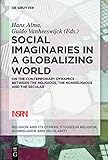Social Imaginaries in a Globalizing World / ed. by Hans Alma, Guido Vanheeswijck.
Material type: TextSeries: Religion and Its Others : Studies in Religion, Nonreligion and Secularity ; 5Publisher: Berlin ; Boston : De Gruyter, [2018]Copyright date: ©2018Description: 1 online resource (269 p.)Content type:
TextSeries: Religion and Its Others : Studies in Religion, Nonreligion and Secularity ; 5Publisher: Berlin ; Boston : De Gruyter, [2018]Copyright date: ©2018Description: 1 online resource (269 p.)Content type: - 9783110441833
- 9783110434156
- 9783110435122
- 306.6 23
- BL60
- online - DeGruyter
- Issued also in print.
| Item type | Current library | Call number | URL | Status | Notes | Barcode | |
|---|---|---|---|---|---|---|---|
 eBook
eBook
|
Biblioteca "Angelicum" Pont. Univ. S.Tommaso d'Aquino Nuvola online | online - DeGruyter (Browse shelf(Opens below)) | Online access | Not for loan (Accesso limitato) | Accesso per gli utenti autorizzati / Access for authorized users | (dgr)9783110435122 |
Frontmatter -- Table of Contents -- Introduction to Social Imaginaries in a Globalizing World -- Section 1: Social Imaginaries. A Historical and Conceptual Analysis -- On the Philosophical Genealogy of the Concept Social Imaginaries -- Social Imaginaries A Conceptual Analysis -- Retrieving Realism in Social Imaginaries -- Section 2: Social Imaginaries as Meaningful Spaces -- Contrast Experiences and Social Imaginaries as Spaces for Truth-Seeking -- The Play of the World Social Imaginaries as Transcending Spaces: From Taylor to Nietzsche -- ‘Plus de Biens’: Jacques Derrida and Charles Taylor -- Section 3: Human Rights and Migration — (Post‐)Secular Social Imaginaries in Contemporary Perspective -- Studying Culture through Imaginaries Some Reflections on the Relevance of Imaginaries for the Social Sciences -- Human Rights as a Secular Social Imaginary in the Field of Transitional Justice The Dutch-Indonesian ‘Rawagede Case’ -- Europe and the Human Rights Imaginary The Role of Perceptions of Human Rights in Europe and Migration Aspirations -- Post-Secular Nationalism The Dutch Turn to the Right & Cultural-Religious Reframing of Secularity -- List of Contributors -- Index
restricted access online access with authorization star
http://purl.org/coar/access_right/c_16ec
How to study the contemporary dynamics between the religious, the nonreligious and the secular in a globalizing world? Obviously, their relationship is not an empirical datum, liable to the procedures of verification or of logical deduction. We are in need of alternative conceptual and methodological tools. This volume argues that the concept of ‘social imaginary’ as it is used by Charles Taylor, is of utmost importance as a methodological tool to understand these dynamics. The first section is dedicated to the conceptual clarification of Taylor's notion of social imaginaries both through a historical study of their genealogy and through conceptual analysis. In the second section, we clarify the relation of ‘social imaginaries’ to the concept of (religious) worldviewing, understood as a process of truth seeking. Furthermore, we discuss the practical usefulness of the concept of social imaginaries for cultural scientists, by focusing on the concept of human rights as a secular social imaginary. In the third and final section, we relate Taylor's view on the role of social imaginaries and the new paths it opens up for religious studies to other analyses of the secular-religious divide, as they nowadays mainly come to the fore in the debates on what is coined as the ‘post-secular.’
Issued also in print.
Mode of access: Internet via World Wide Web.
In English.
Description based on online resource; title from PDF title page (publisher's Web site, viewed 28. Feb 2023)


